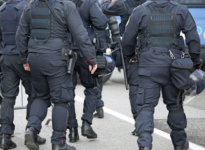‘Fake Lawyer’ Shot Dead by New South Wales Police

A mentally ill man who was previously convicted of falsely representing himself as a lawyer in court has been fatally shot by police in the doorway of a medical clinic in Nowra, on the Southern Coast of New South Wales.
It’s another incident, on the back of several high-profile episodes over the past year, which has people once again questioning the appropriateness of police response to situations in which people are having a mental health episode.
Six police officers, heavily armed, wearing protective gear, can be seen in the graphic footage being circulated online. Police say the man took their ballistic shield when it fell on the ground and was threatening them with a gun. He had become agitated earlier in the afternoon while attending a doctor’s appointment, and police were called when he pulled out a gun in the clinic.
Doctors and patients were evacuated and the man was left to face police, alone.
A ‘spray of bullets’ from six armed police officers
In the video, a police officer can be heard yelling ‘taser’ moments before police unleashed ‘a spray of bullets’.
He has been identified as 34-year old Alexander Stuart Pinnock, a man with a long history of mental health issues – last year pleading guilty to posing as a fake lawyer and representing clients in criminal cases before the court.
Assistant Police Commissioner Peter Cotter has said officers negotiated with the man for more than two hours … “did their very very best … he brandished a gun at them, he was armed with one of our own shields… there was fear in their minds and they acted upon that fear.”
A Critical Investigation team will look into the matter immediately, and this investigation will be reviewed by both the Professional Standards Command (PSC) and the Law Enforcement Conduct Commission (LECC). Mr Pinnock’s death will also be subject to a Coronial Inquest.
Right now, there are many questions which remain unanswered, such as why ‘non-lethal’ weapons such as capsicum spray and tasers were not enough to subdue Mr Pinnock.
It is also unclear whether the firearm that Mr Pinnock was brandishing was real, or a replica.
Inadequate police response to mental health episodes costs lives
And while it is obvious to most people that police must make critical decisions ‘in-the-moment’ there’s also a lot of evidence which suggests that in a significant number of situations police have a tendency to “shoot first and ask questions later” and this is costing lives.
There needs to be serious consideration for the fact that police may not be the right emergency response in these kinds of situations.
In November last year, the minister for mental health Rose Jackson, flagged significant reforms to the way police respond to people in acute distress, and at the time, conceded there were instances in which the current system “failed”.
Mental Health issues are on the rise
Statistics suggest that 52 people who were experiencing mental health distress have died in interactions with police ib the past five years, including 15 people in the 12 months to June 2023.
The wider context of these numbers is that police recorded more than 23,000 callouts for mental health in 2022. In 2019, that figure was just a little short of 16,000.
We know that mental health issues are not only becoming more common, in many cases they are becoming more acute.
The NSW Government is sufficiently concerned with the growing numbers that last year it held a Parliamentary Inquiry exploring a range of issues around mental health accessibility, culturally appropriate services and it also probed the issue of sending out police to respond to these incidents. There have also been calls for an inquiry with more teeth, such as a Royal Commission.
Pacer programme could be replaced
For the past couple of years, NSW Police have been trialling the Pacer program (which involves mental health clinicians working with police) but the organisation has mooted that it is looking to replace this programme.
The Police Association of NSW (PANSW) is advocating for it to be scrapped, primarily because police don’t have the skills required to deal with mental health issues, despite assistance from qualified health professionals. Another very serious consideration is the fact that the mere presence of police – the uniforms and weaponry – can contribute to the agitation of some people already on edge.
Last year, in the UK, which is facing very similar issues to those being experienced here in Australia, the Police Commissioner sought legal advice which determined that there was no legal obligation for the police to perform mental health crises work, and in August set a directive whereby police officers would not respond to mental health callouts unless there is a “real and immediate risk to life or serious harm.”
In the UK, a variety of Health Services are currently working with police on a model called “Right Care Right Care, Right Person” (RCRP) which is essentially a decision-making tool that determines when an emergency call comes in whether it should be attended to by police, or mental health experts.
While we don’t currently have an ideal solution, the fact of the matter is that this is not an issue that can afford to be wrapped in months of consultation, research, and feasibility studies… People who desperately need help are being shot dead the moment they cry out the loudest for that help.







